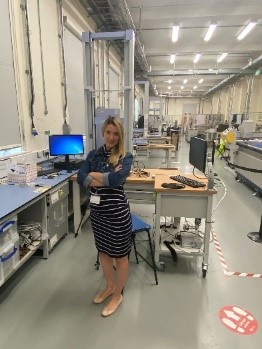
Home > Dr Iryna Tretiak, Lecturer, University of Bristol
Dr Iryna Tretiak, Lecturer, University of Bristol

“I was awarded a Hub Researchers Award with my colleague Dr Geir Olafsson. Our project was about in-process monitoring for AFP processes using Infra-red sensors to facilitate the detection of variations in ply thickness, fibre content and formation of defects. I was attracted to this award because this was one of the very few grants where postdocs were allowed to lead a project. This award enabled me to demonstrate my proposal writing skills and build my track record, and more importantly, it helped me to develop my leadership skills and provided me an invaluable opportunity to develop my own research ideas. This project led to further discussion with an industrial collaborator.
I come from Ukraine and have been living in the UK since I came to study my PhD in 2014. I was brought-up in a family of mostly medical doctors, and this was the path I was expected to follow. However, as a little girl, I was fascinated by technology and space, and dreamt of becoming an astronaut. But growing up in Ukraine, I was often asked why I chose such a ‘male’ profession and told to focus on getting a more ‘female’ appropriate education. Despite this, I decided to study at the National Aerospace University in Ukraine. I received great support from my grandad, who was an engineer, and he encouraged me to pursue my dream and helped me to prepare for the university entrance exams, and I succeeded!
After six tough years at the University, absorbing knowledge in aerospace design, manufacture, and material science, whilst fighting the prejudices of ‘what a female’s role in life’ is supposed to entail, I received Bachelor’s and Master’s degrees with honours, graduating top of my class.
My career was developed slowly for various reasons, with some detours prior starting my PhD. In my four years as a Postdoc, I have accomplished a significant amount despite the impact of a war in my home country, Ukraine, and several unavoidable career breaks due to two maternity leaves and the impact of the coronavirus pandemic. In the face of these challenges, I have remained determined to achieve my career goals, actively seeking out opportunities to continue my research and professional development even during my maternity leave. I have also successfully advocated for the funding of a female Ukrainian researcher from Kharkiv, who has subsequently been able to settle in Bristol with her Mother and Son to escape the war in Ukraine. During my most recent maternity leave, I applied for a Lectureship at the University of Bristol, and despite the challenges of juggling childcare with preparing my application, I have recently been appointed as a Lecturer in Composites Manufacture.
I have tried to tackle these challenges head-on; however, it is a dawning realisation that academic progression is stunted by extended absences more so than many other professions due to the inability to apply for funding prior to and during these periods, and the knock-on effect this has to research output and career progression.
In my new role, I will also look to further raise my profile as an ambassador for females, and particularly working mothers in STEM and high-level research. I believe that I can contribute to a future where my daughter is ensured of a diverse and inclusive working environment, along a career path not influenced by gender stereotypes.”